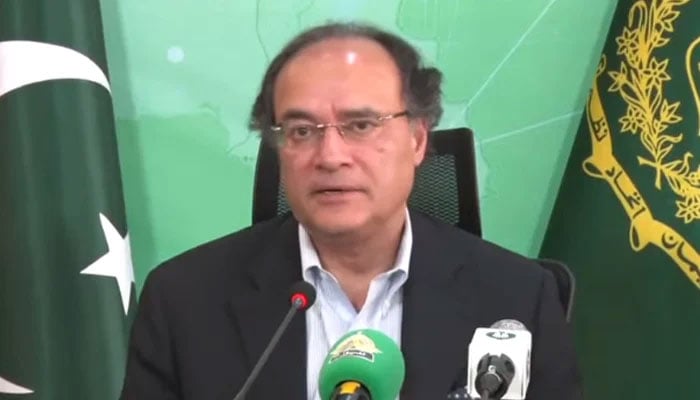ISLAMABAD: Finance Minister Muhammad Aurangzeb announced on Sunday that virtual negotiations with the International Monetary Fund (IMF) are progressing positively, with an extended fund facility worth $6-8 billion expected to be agreed upon in July 2024.
Addressing a news conference here, he said: “Our goal is to ensure this is the final IMF programme,” underscoring the importance of macroeconomic stability to prevent severe economic damage.
Commenting on a recent resolution in the US House of Representative regarding elections in Pakistan, Aurangzeb clarified that it was unrelated to the IMF programme. “Discussions with the IMF officials during the US visit were satisfactory. This will be our last IMF programme, lasting three years, with a size under negotiation, likely between $6 and $8 billion.” Implementation of the Fund’s preconditions and benchmark actions is ongoing, emphasizing that the IMF programme is crucial for macroeconomic stability, which remains the government’s top challenge.
The federal government adopted a Rs18.9 trillion federal budget 2024-25 with tax-raising measures to secure the IMF bailout, after nearly defaulting last year. This includes increased taxes on the salaried class, normalisation of taxes for exporters, a petroleum levy increase, and new taxes on the real estate sector. “Our major focus areas include increasing exports, attracting direct foreign investment and continuing discussions with Saudi Arabia and the United Arab Emirates. Work on the second phase of China-Pakistan Economic Corridor is also in progress,” the minister said and added that the government plans to access international capital markets and issue Panda Bonds in the next fiscal year.
The minister also revealed that starting July 1 (today), taxes will be imposed on shopkeepers and retailers. To date, 42,000 retailers have registered for the tax, he added.
He addressed pension reforms, stating that the new pension system would apply to civil employees starting on July 1 [today], and to the armed forces from the next year. The armed forces have been granted a one-year exemption to adjust their service structure. Pension expenses currently stand at Rs1 trillion, and work is underway to manage these costs. Discussions about raising the retirement age are also ongoing.
Reflecting on past decisions, Aurangzeb noted that efforts to tax retailers during Miftah Ismail’s tenure in 2022 should have been implemented sooner, which could have generated significant revenue by now. He acknowledged the pressure on people due to new taxes, particularly on salaried individuals, and promised relief as soon as fiscal conditions allow.
The Petroleum Development Levy (PDL) will not increase from July 1, although it has been raised to Rs70/litre. He explained that this [Rs70] is a ceiling to be kept as headroom.
He emphasized the importance of maintaining economic stability, eliminating non-filers and allocating funds for exporters’ Drawbacks on Local Taxes and Levies (DLTL) payments, warning that problems would persist without structural reforms.
All tax refunds up to June 30, amounting to over Rs50 billion, will be paid within two to three days. Exporters’ DLTL payments will also be settled soon, he announced.
Aurangzeb highlighted that the fiscal year is ending with stable economic indicators, reduced fiscal and current account deficits and a stable currency. Inflation has decreased from 38 per cent last year to 12pc. He noted the removal of obstacles to the repatriation of profits from foreign investments, with backlogs cleared by the end of May, and resolved issues related to letters of credit (LCs) due to economic stability.
He said the government was digitalising the Federal Board of Revenue (FBR) operations to combat corruption, leakages and tax evasion, which involved both the FBR and taxpayers. “Corruption cannot happen from one side alone,” he said, indicating the need for technology to curb this trend.
Addressing the issues of sales tax corruption and leakage amounting to Rs750 billion, he emphasized reducing human involvement in the FBR to curb corruption. “The prime minister chaired a meeting on FBR digitalisation yesterday, and by the end of May, we had cleared the backlog, demonstrating that 30pc growth is achievable,” he added.
The FinMin reported that tax revenue collected this fiscal year stands at Rs9.30 trillion, showing a 30pc growth. He asserted that eliminating corruption and tax evasion would further increase tax revenue.
He also outlined the government’s plan to simplify the tax collection system and to consider proposals from the Federation of Pakistan Chambers of Commerce & Industry (FPCCI). He announced an ambitious plan to increase Pakistan’s tax-to-GDP ratio to 13pc within next three years, highlighting the current ratio of 9.5pc as unsustainable.
“We aim to elevate the tax-to-GDP ratio to 10.5 per cent next year and achieve 13 per cent within three years,” said Aurangzeb. He also stated that the Public Sector Development Programme (PSDP) would see a reduction of Rs250 billion, with a shift towards public-private partnerships similar to those in Sindh.
Aurangzeb also addressed the government spending, noting that ministers had refused to accept salaries, and they were paying their utility bills from their own pocket as a symbolic gesture.
The finance minister mentioned consultations with the provinces on revenue and expenditures, urging them to manage their expenses and include province-specific projects in their annual plans. He acknowledged the discomfort caused by new tax measures, expressing sympathy for the public and promising relief with economic improvement.
Stabilising the economy and achieving sustainable growth involves provincial contributions, Aurangzeb stated, noting that enforcement actions would continue to combat corruption, with tax-related court cases amounting to Rs2.7 trillion pending resolution.
The minister revealed measures to abolish tax exemptions worth Rs3.9 trillion and bring builders and developers in the real estate sector into the tax net. Aurangzeb justified the recent increases, stressing the need to document Rs9 trillion in real estate cash circulation.
Aurangzeb stated that ministries slated for dissolution would be officially announced soon by the PM, citing the decision to shut down the Public Works Department (PWD) as an example. The PWD employs 6,100 people and has been plagued by corruption issues. Employees of dissolved departments would be retained within the same departments or provided with severance packages.
Aurangzeb revealed ongoing reforms in the energy sector, including integrating private sector professionals into electricity companies’ boards and progressing with outsourcing and privatisation initiatives.
On the energy sector reforms, he acknowledged the ongoing work against electricity theft and structural reforms. He maintained tax exemptions on essential items like stationery, charitable hospitals and pesticides.
He highlighted restored confidence from the global community and international institutions in government actions, citing the World Bank’s approval of funds of $1 billion for the Dasu Dam and the International Finance Corporation’s support for PTCL.




